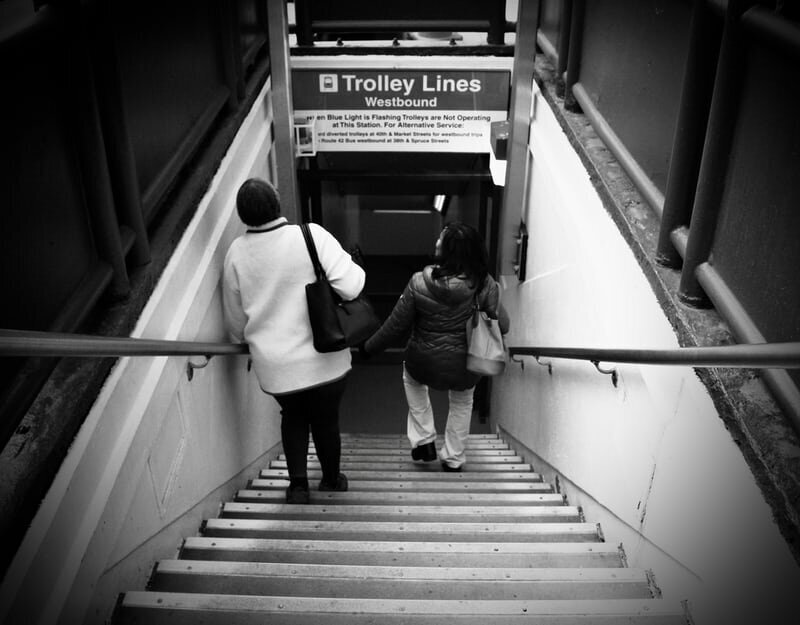Subway Dancers
By Constance Garcia-Barrio
At Broad and Erie, with luck, you’ll board a subway car where veteran street dancers from the Motion Monarchs and Project Positive stand poised to burst into action.
“What time is it?” one dancer asks.
“Show time!” another says.
As the train roars toward City Hall, one dancer grabs the car’s metal poles and does flips, splits, and tricks where, at one point, his sneakers brush the car’s ceiling. The instant he stops, the next man jumps in.
Passengers wake up, crane their necks, and watch. These dancers don’t just soften riders’ morning blues. They pulverize it.
“We distract people from their upsets,” says Jericho Ter Ra El, 29, who teams up with his twin brother, Tehama, to form the Motion Monarchs. “We give them some joyfulness.”
The dancers, who sometimes perform in separate groups and sometimes as a collective, crown their shows with a script that weaves in jokes, health tips—“An apple a day helps keep the doctor away”— and fast philosophy: “Take care of yourselves, but most importantly, take care of each other,” the men say in unison.
Afterward, riders applaud, give a dollar here and there, and pile on thank-yous for the caffeine-free jolt of energy.
The collective has gained fame on the Broad Street Line.
“We’ve danced in the subway for ten years,” says Philadelphian Damon Holley, 31, founder of Project Positive, an organization that aims to inspire youth through hip-hop dance. “We want to lift people’s spirits and help young people learn life skills through dance.”
The collective performs on the subway one to three days a week and earns $60 to $100 in a couple of hours.
“It takes stamina, but it’s worth it to see people smile when they watch us,” Tehama says. “They recognize us on the street and thank us for brightening up their day.” View profile video of Project Positive’s founder on their instagram page.
Dancing on the Broad Street Subway, and occasionally on the Market-Frankford Line, hasn’t always been a smooth ride for the collective.
“In 2014, during an evening rush hour, I got arrested for dancing on the train,” says Holley. “I was locked up for 17 hours. I was like the martyr who bore the brunt. Later, we got cool with the transit cops.”
Different factors led the Philadelphia-born Ter Ra Els, two of five siblings, to dance. “Years ago, we saw ‘You Got Served’ [a 2004 dance comedy-drama], and really liked it,” Tehama says. “Dance faded to the background when we played football at Gratz High School. But in 2011, when we saw a cousin of ours dance at a party, it brought us back to dance. Now we’ve taken part in dance competitions and won prizes.”
Family support helped Holley, from a single-parent household, to find his way performing abroad.
“My cousin was a four-time dance winner at the Apollo Theatre Talent Show [in New York],” says Holley, who started street dancing in 2010. “He showed me some moves and encouraged me.” That year, Holley danced with a hip-hop troupe at the Brooklyn [New York] Academy of Music. A The New York Times story about the troupe came to the attention of the U.S. State Department. “Thanks to that story, we performed in Russia, Belarus, and the Ukraine under a State Department program in 2013.”
Family members also inspired collective member Antiwne Freeman, 29, born in Ghana and raised in Philly. “Drumming and dancing were part of my upbringing,” he says. “I include West African moves in my dancing.”
Family support nourishes members of the collective in one way, but they also rely on a clean diet to maintain the stamina their routines demand. Many of them are vegetarian, including some vegans. They also stretch, run, lift light weights, do abdominal workouts, and practice martial arts to stay in top form.
“It’s more than physical conditioning,” says Jericho Ter Ra El. “We do yoga and meditation for spiritual centering. We have to start from a good foundation to lift audiences.”
The collective has begun to both touch more lives and generate more income.
“We perform at children’s parties, school shows, and places like West Chester University and Indiana University,” Tehama says.
Much in demand at schools, they’ve also become popular at street fairs.
“We’ve done shows at the South Street Festival, Outfest, Odunde, Penn’s Landing, City Hall, the Manayunk Streat Food Festival,” Holley says. “Sometimes, it’s hard to get a permit for our performances. They don’t know how to classify what we do, so they don’t give us a permit. That can wear you down.”
But Holley and other dancers have made inroads.
“We provide entertainment at 76ers games,” he says. “We do the fancy slam dunks and other routines.”
The collective has wowed far-flung audiences, but their main goal lies close to home: To give Black youth life skills wrapped in the medium of dance. “It’s all about inspiring the youth in our community through HIP HOP [H(ealthy) I(ndependent) P(eople) H(elping), O(ther) P(eople)”says Holley. He and other members of the collective have done dance workshops at recreation centers and other settings where they can touch young lives. “Now I teach in the KIPP Charter School’s afterschool program.”
Members of the collective fold crucial advice into dance lessons. “We tell the children to choose healthy foods—fruits and vegetables—to have energy,” Jericho says. “We also stress staying focused not only to learn dance steps, but for children to reach their goals in life.”
In addition, the dancers work key beliefs into their scripts for the general public. “Our scripts stress unity, brotherhood, and non-violence,” Holley says. “That includes cutting gun violence. I’ve been shot, and almost everyone in the collective has been shot at,” he says. “We stress core values that young Black men, especially the ones who grow up with no father figure, need.”
Project Positive, which recently became a 501(c)3 nonprofit group, has its headquarters in REC Philly, 901 Market Street, a space for creative artists of all kinds.
“We would like to have our own multi-use space for dance classes,” Holley says. “It’s about giving back. If it weren’t for dance, I woul
d be in jail now.”
* * * *
For more about the Motion Monarchs, call (267) 664-6757 or Google Motion Monarchs. For information about Project Positive, call (267) 255-5041 or Google Project Positive.








